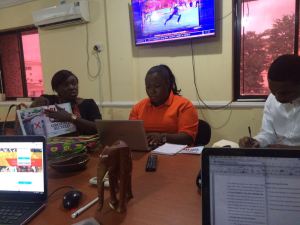The Stop Don’t Drop group in collaboration with Chanja Datti seeks partnership with Connected Development (CODE) in creating awareness on Environment sustainability and anti-littering stance.
Speaking at an interactive section held at CODE office in Abuja, the convener/Initiator of “Stop Don’t Drop”, Adiza Ujo said a research was conducted shortly after the fuel scarcity hit Nigeria.
She said the outcome of the research showed that many car owners who queued to buy fuel ended up buying eatables after which they littered the environment with wraps of whatever was bought.
“We found out the long queues at the filling Station led to more dirty in our environment, because while they wait for their turns to buy fuel the just buy “Gala and Lacaserra” drinks after which they just throw on the floor,”she said.
Ms Ujo noted that it is therefore necessary to enlighten the public on the use of waste bin or trash bags to deposit waste.
She further added that aside from depositing refuse dumps, such waste could be recycled into other products.
Also speaking,the Managing Director of Chanjia Datti, Ms Funto Boroffice said its not just about throwing dirty into trash bags, adding that when a trash bag could be returned back to the company for recycling.
She said it’s a way of also keeping the environment clean and to also create avenues for cab drivers to earn more income regardless of how little it may be
“Our focus are cab drivers and Keke riders, we intend to give them bag so that there passengers can throw their dirty in it,
“Once this is done the cab drivers are meant to bring back the bags to us with the dirty in it, after which they could either get recharge cards or a liter of fuel”, she said.
 She said that about 50,000 or more stickers will also be launched, adding that the stickers will be at the bumper of every cabs and keke in Abuja environs.
She said that about 50,000 or more stickers will also be launched, adding that the stickers will be at the bumper of every cabs and keke in Abuja environs.
“The essence of this stickers is to help car owners stop littering the road with dirty, by throwing it out the window while driving,
“I am certain that when the car behind the one that has a sticker that says “Stop don’t Drop” , he or she will think twice and not throw the dirty outside the window, “she said.
The Chief Executive of CODE, Hamzat Lawal, commended the group for this initiative, adding that CODE will assist in any possible way it can.
“I think it’s important that it is also treated at the senate level, whereby a bill is passed on that effect alongside policies,”he said.
He added that CODE will ensure the media helps broadcasts this initiative so that the information can get to the public as wide and fast as possible
“ We would try and engage BBC Hausa to help amplifier alongside Wazobia fm, we could also make any of the Host on Wazobia fm an ambassador,”he said.
The monitoring and Evaluation manager of CODE, Oladotun Babayemi, suggested that everybody not just car owners or Keke riders should also engage themselves in recycling.
” i would advice you start publicity through congregation, it would help a lot in sending the message across,”he said.
Chanja Datti is committed to transforming waste to value with an increasing demand to rid the environment of non-biodegradable waste materials.
Stop don’t Drop seeks a green trash free environment.







 Speaking at an In-house training organised by CODE, the monitoring and Evaluation Officer, Oludotun Babayemi said Follow The Money is planning a virtual newsroom that will run 24 hours – several times in a month with the objective of strengthening the voice of 95 million Nigerians leaving in rural communities in Nigeria, while increasing their participation in governance.
Speaking at an In-house training organised by CODE, the monitoring and Evaluation Officer, Oludotun Babayemi said Follow The Money is planning a virtual newsroom that will run 24 hours – several times in a month with the objective of strengthening the voice of 95 million Nigerians leaving in rural communities in Nigeria, while increasing their participation in governance. 

 She said that about 50,000 or more stickers will also be launched, adding that the stickers will be at the bumper of every cabs and keke in Abuja environs.
She said that about 50,000 or more stickers will also be launched, adding that the stickers will be at the bumper of every cabs and keke in Abuja environs.






